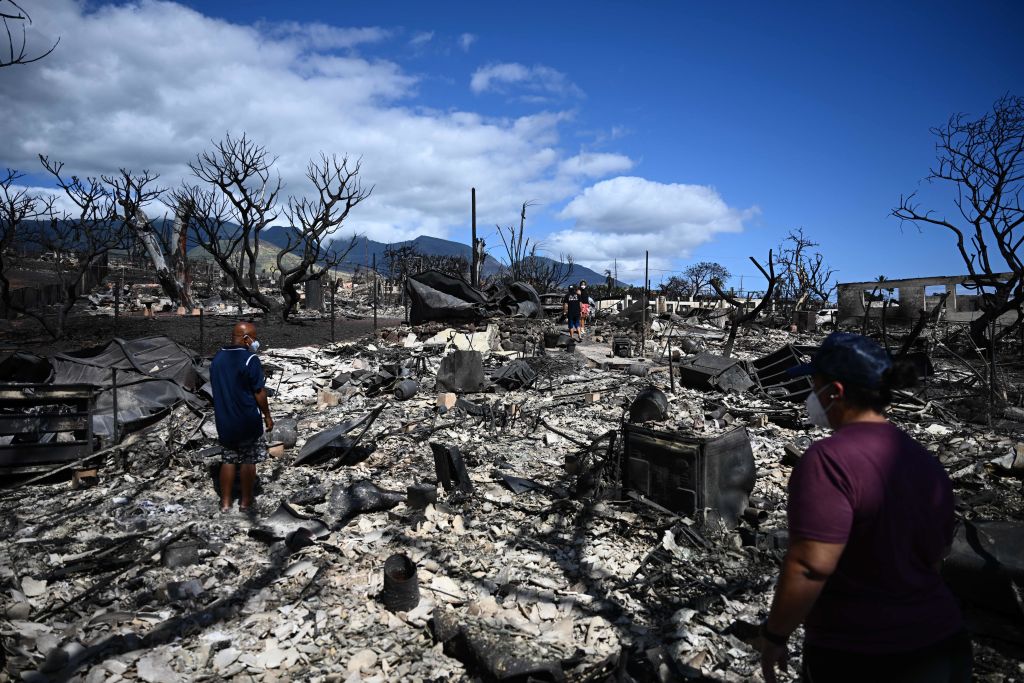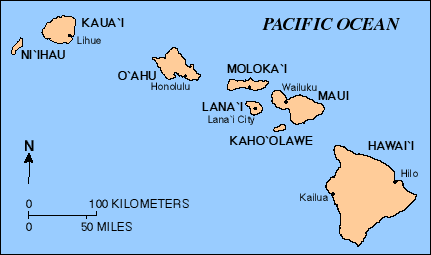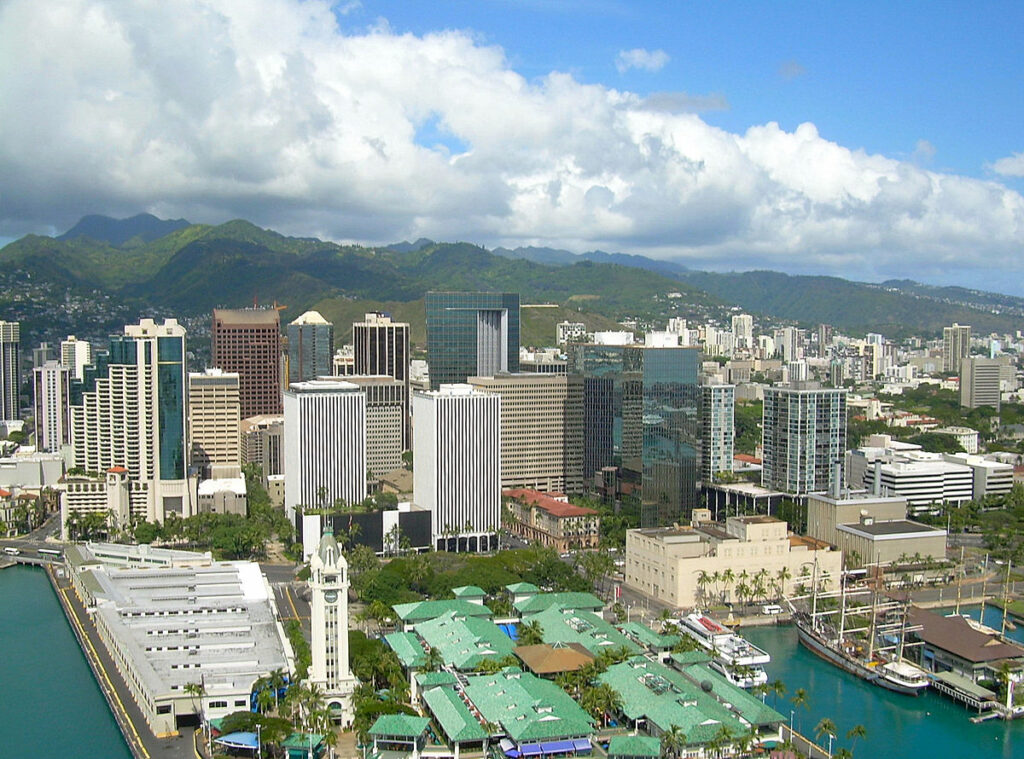Why Native Hawaiians Are Being “Pushed Out of Paradise” in Their Homeland
ASIA--PACIFIC, 13 Nov 2023
Adam Yamaguchi and Kerry Bree | CBS News - TRANSCEND Media Service
4 Nov 2023 – Doreen Hall is among the thousands of native Hawaiians who decided to leave the state with her family because of rising prices in the area. Each year, 15,000 native Hawaiians leave the state for the mainland, which now boasts a larger Hawaiian population than Hawaii itself. There are fears that rebuilding from the wildfires that ravaged Maui over the summer will lead to even more displacement.
Hall was born and raised in Pearl City, Oahu moved to Las Vegas. Hall can return to the state for short vacations, but she said it’s not the same. “This is where my heart is, you know?… This is where my mom and dad are laid to rest,” Hall said.
Unlike city dwellers priced out to the suburbs, native Hawaiians aren’t just leaving their homes. They are also leaving their home land as rampant development, an influx of mainlanders moving to the state, and growing tourism price them out of the islands.
Some families are even torn apart by the decision to move. Hope Mamala, 17, had to finish high school alone after her parents left Hawaii to pursue economic opportunities on the mainland. Leaving the state, Mamala said, is “not a choice” for many.
“It’s really sad, because I’m really close to my parents,” Mamala said. “… I think Hawaiians are being pushed out of paradise. There’s just nothing left for us here to really call our own.”
Shantashia and Richard Pelen, who have five children, are among the many who are out of options. Richard Pelen said the state’s cost of living – the highest in the country – makes it “impossible for us to give our kids something out here.”
“By going to the mainland, we can put our kids in a home that we can call ours,” Richard Pelen said.
On the mainland, Hawaiians are settling in what’s been nicknamed the “Ninth Island of Hawaii:” Las Vegas, Nevada. It may seem a surprising choice, but Hawaiians were pioneers of the city’s entertainment scene in the 50s and 60s, and over the decades, visitors became residents. As the cost of home ownership in Hawaii skyrocketed, the trickle of people moving to Vegas became a near exodus. Hall is among those who have made the “huge sacrifice” to make Las Vegas their adopted home.

The aftermath of recent wildfires in Lāhainā, Maui, Hawaii, on August 11, 2023.
(Patrick T. Fallon / AFP via Getty Images)
“We can enjoy to live here. We can breathe,” Hall said. “We can afford the mortgage payments. To actually work to live instead of living to work is amazing.”
Hall said that the thriving Hawaiian community in Las Vegas made the move easier. As the past president of the Hawaii Las Vegas Civic Club, Hall remains active in the group, which is aimed at helping transplants find community and opportunity in their new city. Hawaiian-owned businesses are opening up each year, offering options that couldn’t be found on the islands.
“I think a lot of ohana (is) here in Las Vegas,” Hall said. “We create our own Hawaii and we continue to bring our traditions here every day.”
The Pelen family said they hope to find these same opportunities, as they move away from the only home they’ve ever known.
“I think the biggest thing that I don’t want my son to lose … (is) Hawaiian values, how to speak Olelo Hawaii (the state’s indigenous language), how to understand Olelo Hawaii, learn how to treat each other with that aloha,” said Richard Pelen, referencing a belief in compassion, harmony and love. “They instill a lot of good qualities in my son that represent who the Hawaiian people are, what we’re about.”
Despite what she’s built in Las Vegas, Hall said she hopes to move back to her homeland someday.
“The mythology back home is the hono (turtle) will always return home one day,” Hall said. “And when that day comes, our home will welcome us with open hands and aloha. For now, this is home.”
Tags: Asia and the Pacific, Coup, Hawaii, Occupation, Polynesian Culture, USA
DISCLAIMER: The statements, views and opinions expressed in pieces republished here are solely those of the authors and do not necessarily represent those of TMS. In accordance with title 17 U.S.C. section 107, this material is distributed without profit to those who have expressed a prior interest in receiving the included information for research and educational purposes. TMS has no affiliation whatsoever with the originator of this article nor is TMS endorsed or sponsored by the originator. “GO TO ORIGINAL” links are provided as a convenience to our readers and allow for verification of authenticity. However, as originating pages are often updated by their originating host sites, the versions posted may not match the versions our readers view when clicking the “GO TO ORIGINAL” links. This site contains copyrighted material the use of which has not always been specifically authorized by the copyright owner. We are making such material available in our efforts to advance understanding of environmental, political, human rights, economic, democracy, scientific, and social justice issues, etc. We believe this constitutes a ‘fair use’ of any such copyrighted material as provided for in section 107 of the US Copyright Law. In accordance with Title 17 U.S.C. Section 107, the material on this site is distributed without profit to those who have expressed a prior interest in receiving the included information for research and educational purposes. For more information go to: http://www.law.cornell.edu/uscode/17/107.shtml. If you wish to use copyrighted material from this site for purposes of your own that go beyond ‘fair use’, you must obtain permission from the copyright owner.

